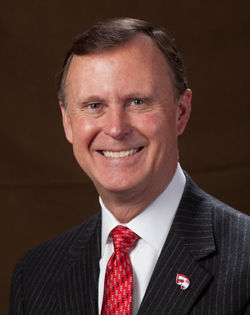Ransdell, WKU announce privatized Health Services in response to potential budget cuts
March 25, 2014
University officials have decided to privatize WKU Health Services in response to another $1.5 million loss and snowballing budget troubles.
“First, we can achieve a net savings of more than $1 million to apply to our campus-wide budget cut that will reduce the amount of the cut for each division of the university,” President Gary Ransdell said in the email sent last Thursday. “Secondly, we want to give private sector medical providers the opportunity to show us how they might operate our Health Services program in a more efficient manner, and provide enhanced services to faculty, staff, students, and perhaps even the general public.”
While the university cannot guarantee Health Services’ current employees a job with the winning bidder, WKU is strongly encouraging the bidder to hire the existing staff. Employees weren’t involved in the decision and were informed of the privatization the morning the email was sent university-wide.
“You can’t speculate with those kinds of decisions,” Ransdell said. “If you go through the speculation and analysis and involve everybody in that process, you create a lot of tension. If you decide not to do it, you put them through a lot of stress unnecessarily. You don’t communicate with the people involved until the decision has been made to move forward.”
Vice President of Finances Ann Mead declined to comment on the decision to privatize Health Services, saying no further decisions have been made yet. WKU Health Services could not provide a representative to comment on the matter.
The recent financial loss comes from a drop in student enrollment, continuing the trend from last semester.
“As you recall from our communication last fall, we had a revenue shortfall of approximately $1.6 million in the fall semester,” Ransdell’s email said. “We, therefore, must address a $3.1 million budget reduction as we prepare next year’s budget before we deal with covering our fixed-cost increases, a state budget cut, or a salary and/or benefits increase.”
The loss wasn’t unexpected and was a smaller loss than in spring 2013, Ransdell said.
WKU also faced a potential $1.8 million loss from a 2.5 percent cut proposed by Gov. Steve Beshear in January. Monday afternoon the Senate eliminated the cut.
Currently, state universities and colleges await an inevitable tuition cap from the Kentucky Council on Postsecondary Education, setting the maximum percentage students’ tuition will increase. Since late January, WKU officials expect between a 3 to 4 percent increase.
“We’ve got a lot of challenges, but tuition is not the answer,” Ransdell said. “There will be an increase, but we’re not going to be able to balance the budget with that increase, so we’ll have to balance it with our spending.”
Most budget decisions will be made by mid-April to present to the Board of Regents, and Mead expects further decisions closer to that date. One factor the university won’t be using to balance the budget is anticipated enrollment increases, Ransdell said.
“We’re going to build it on what we know, which is what we’ll finish this year with,” he said. “If we do have better enrollment growth, we may have created an opportunity to sure up some things. We’re working hard to improve the numbers, but we’re not going to take a risk and assume anything.”


























